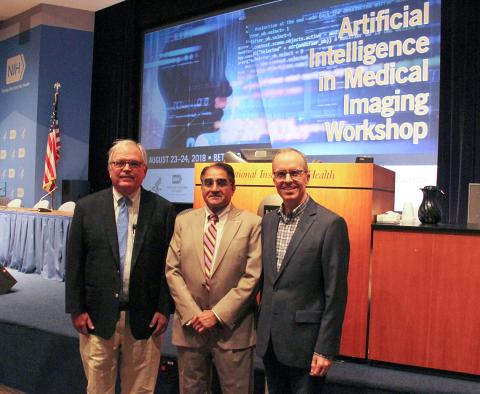NIBIB Holds Workshop on AI in Medical Imaging

Photo: Raymond Macdougall
Artificial intelligence (AI) is tantalizingly close to being incorporated in medical practice, perhaps more quickly into the field of medical imaging than anywhere else. Through AI, computers can be trained to rapidly and reliably assist doctors with clinical information-gathering and image analysis that may improve diagnoses, treatment plans and patient outcomes.
The National Institute of Biomedical Imaging and Bioengineering recently hosted a 2-day workshop to consider the increasingly sophisticated and powerful capabilities of AI in medical imaging. The workshop drew national and international experts to attend and view the videocast; they represented universities, federal agencies and industry as well as various science and medicine specialties. Many have experienced the early advances of AI. In a raised-hand survey, most indicated they have already used AI tools in their research; only an estimated 5 percent, however, have ever used AI tools in their clinical practice.
Workshop co-chair Dr. Krishna Kandarpa, director of research sciences and strategic directions in the Office of the NIBIB Director, explained that much of the research and development related to AI in medical imaging is impressive, but has occurred independently and in silos. “Interdisciplinary collaboration and interoperability of systems are important necessary developments going forward,” he said, noting that the timing of the workshop is important for fostering an environment for future collaborative partnerships that will accelerate progress for the field. “The promise of AI application to medical imaging is essentially limitless.”
The meeting addressed state-of-the-art AI applications in medical imaging, hurdles that would impede their quality, reproducibility and reliability and ways AI can improve the value of medical imaging to health care overall. Among the challenges impeding faster implementation is that annotation of images is expensive and at times inconsistent, underscoring the importance of improving annotation methods and curation of images.
Stanford University School of Medicine’s Dr. Curt Langlotz, professor of radiology and biomedical informatics, co-chaired the workshop. He also serves on the board of directors of the Radiological Society of North America (RSNA) as liaison for informatics. He described AI and machine learning as entirely new paradigms for the analysis of images and the creation of clinical decision support systems for imaging professionals.
“These machine learning methods are compelling because of their accuracy relative to the methods they are replacing,” Langlotz said. “Every imaging research laboratory I know is experimenting with these tools. We need to avoid re-inventing the wheel and efficiently deploy research resources for the benefit of the entire research community.”
He outlined several areas where AI research could improve the use of clinical images in medical practice, such as when medical images are ordered, acquired and interpreted. He described not only how machine learning can enhance computer-aided disease detection and classification to increase diagnostic accuracy, but also how AI applications can provide decision support throughout the imaging life cycle in patient care.
For example, AI methods can optimize the imaging request, enhance image reconstruction to reduce radiation dose, triage images for timely identification of critical abnormalities and assure result communication for appropriate follow-up. “Although we are already seeing clinical applications, we are still a few years away from widespread implementation of these machine learning algorithms,” Langlotz said.
Also co-chairing the workshop, Dr. Bibb Allen is chief medical officer for the American College of Radiology Data Science Institute and a radiologist at Grandview Medical Center in Birmingham, Alabama. “We are seeing multiple specialty societies become engaged in assessing and guiding the impact of AI on their specialties,” he said. “I see AI in health care as an important enough advancement that as a society we cannot afford to have such tools reserved only for large, well-funded medical centers. Certainly, business models will need to be developed to help deliver AI tools to widespread medical practice. One issue is that these models must avoid a two-tier system where some health systems are able to afford AI tools for their patients and others are not.”
The workshop discussions will be distilled and published in a report that provides a roadmap for future research geared towards accelerating the development and implementation of AI technology in clinical imaging, which promises to change the practice of medicine.
In addition to NIBIB, the workshop was co-sponsored by NHLBI, NCI, NIAID, NIDCR, the American College of Radiology, RSNA and the Academy for Radiology & Biomedical Imaging Research.
